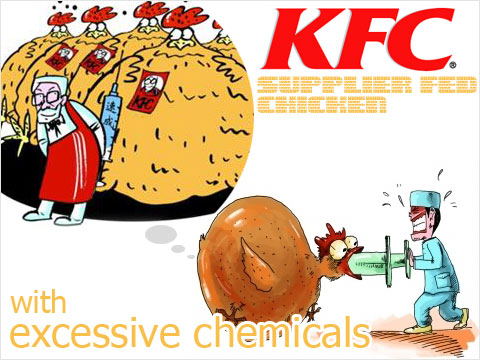KFC supplier fed chicken with excessive chemicals

Excessive amounts of antibiotics were found in eight batches of raw chicken samples taken from KFC supplier Shandong Liuhe Group from 2010 to 2011, the Shanghai Food Safety Office said in a statement on Thursday.
Local authorities have also launched investigation in Beijing and no chicken from Liuhe has been found in the capital market, the Beijing News reported yesterday.
In 2005, the Shanghai Institute for Food and Drug Control signed a contract with the China division of Yum Brands in Shanghai, which owns KFC, to provide third-party testing services for its raw materials and semi-finished products, the statement said.
From 2010 to 2011, a total of 19 batches of raw chicken samples from the Liuhe Group were tested, and eight of them were found to contain excessive amounts of antibiotics. All the testing reports were sent to Yum Brands.
KFC told China Daily that it strictly implements the country's regulations regarding raw material purchases, and has evaluated the qualification of suppliers, and sent samples to qualified third-party bodies for testing.
KFC added that in 2010, excessive amounts of antibiotics were found in raw chicken supplied by the Liuhe Group and Yingtai Co, and that KFC sent back the raw chicken to the suppliers and required them to rectify the situation.
In 2011, KFC withdrew the qualification of Liuhe's Linyi factory to supply raw chicken. In 2012, considering the safety risk, KFC also terminated the supply contract with the Liuhe Group, it said.
However, Shanghai's food safety office said yesterday that Yum Brands found excessive antibiotics in chicken from the supplier in 2010 but didn't report it and kept on buying the tainted chicken.
The company and the Shanghai Institute for Food and Drug Control will receive the "strictest punishment" if they are found to have broken food safety laws, the food safety office said yesterday in an investigation report on the tainted chicken.
The company sent samples to the institute every two months and paid several million yuan a year for the service, Shanghai Television (STV) reported.
Liuhe had bought the problem products from several farms where chickens were fed chemicals laced with illegal medicine and 18 kinds of antibiotics to keep them alive and boost their growth, China Central Television reported earlier.
Reports showing that the chicken that contained excessive antibiotics were sent to the company by the institute, but neither the company nor the institute reported the problem to the city government, food safety officials said.
Instead, Yum Brands kept buying chicken products from Liuhe until August this year, the report said. The company said they stopped buying not because of food safety problems but due to "adjustment of strategic layout," according to STV.
"The company should have taken action as soon as it found problems in its raw materials. It should have reported to the city government, tightened management of its supplier or just stopped purchasing products from it," said Gu Zhenhua, deputy director with the food safety office.
The office said it was inspecting 32 samples from eight kinds of poultry products from Yum Brands' Shanghai logistics center.
Yum Brands told STV that it was still investigating the situation.
Animal nutrition experts said that chemical compound medicines, most antibiotics and hormones, are banned from being fed to stock and poultry.
The experts added that some chickens are fed large doses of antibiotics because many Chinese farmers don't have the money or want to spend the money to raise the birds in larger and cleaner pens.
The CCTV report said that the chickens — which had inferior health conditions and reached full growth within about 40 days — were sold to the Liuhe Group and Yingtai Co, both KFC suppliers.
This year, Yum Brands sent a total of 283 batches of samples for test, which didn't include the products from Liuhe, according to the Xinhua News Agency.
The administration's probe revealed that the logistics center's purchase records suggest that no purchases were made from Liuhe after May.
Toxicologist Lu Dun said that the incident exposed some flaws in the system. "For the testing body, it's hard to find out how the clients will deal with the chickens after the test results are unveiled," Lu said.
| Touched | Sympathetic | Bored | Angry | Amused | Sad | Happy | No comment |
More Articles
-
没有相关内容
 Weibo
Weibo Twitter
Twitter


